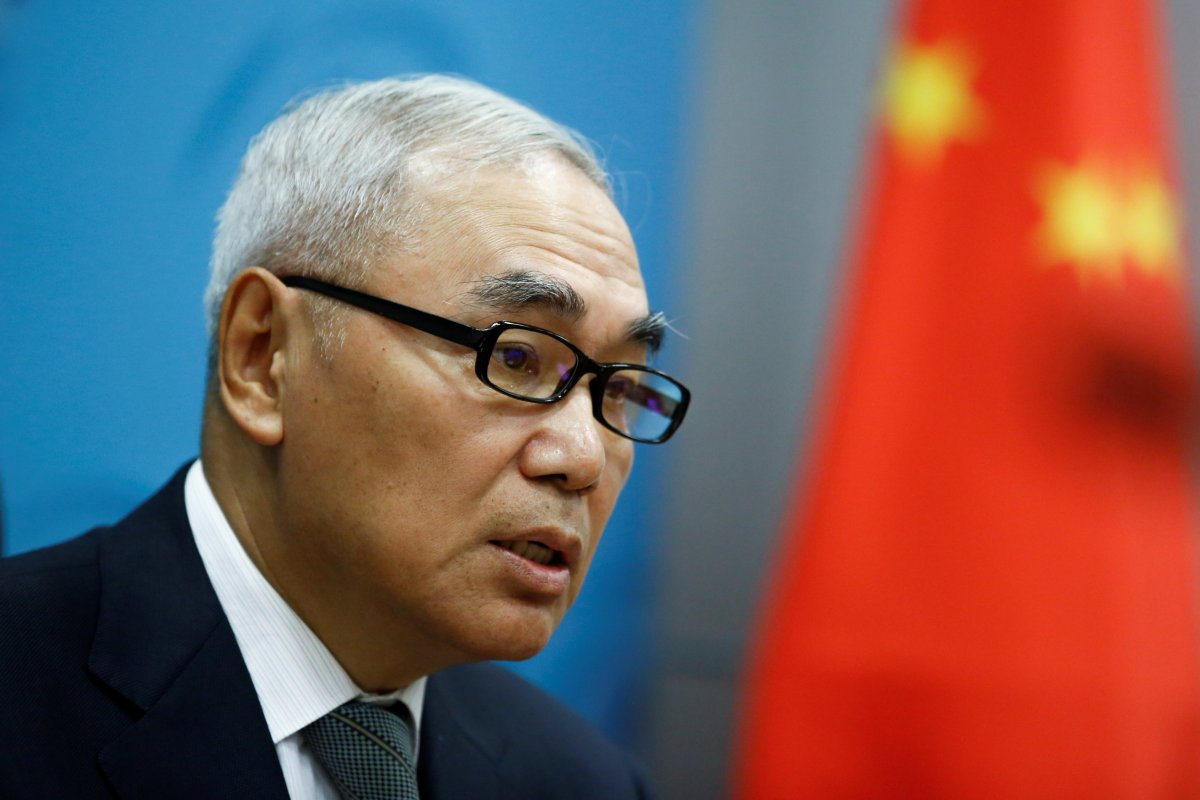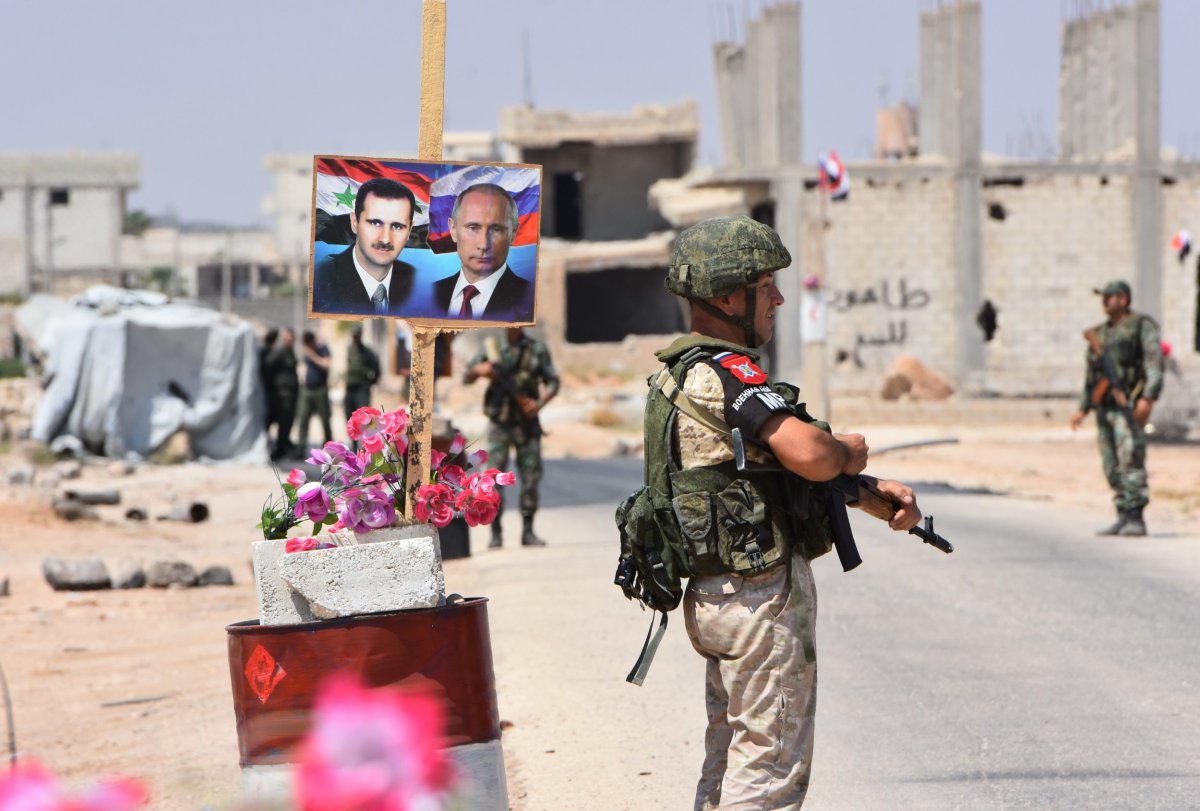The U.S. and Russia are preparing to enter new phases of the Syrian conflict in which their respective local allies will make final pushes to defeat militant groups, but fellow world power China won't be stepping in.
The U.S. supports the Syrian Democratic Forces, a mostly Kurdish faction of local fighters battling the Islamic State militant group (ISIS), while Russia—along with Iran—backs the Syrian military against ISIS as well as other rebels and jihadis that rose up in the wake of 2011 uprising. As the two international axis prepared for new offensives on opposite sides of the country, Beijing's special envoy to Syria denied that China had deployed troops or planned to deploy troops in support of its Russian ally, as was reported in some news outlets in the Middle East.
"Recently, some media speculations that China is going to involve in the Syrian conflict emerged. That is a false picture of the Chinese policy. These Arab media, which issued the relevant material, later explained that China had no military presence in Syria. China is strongly advocating settlement of the conflict only by peaceful means.... China has never sent its troops to Syria," Chinese special envoy Xie Xiaoyan told reporters Monday, about a month after visiting Israel, Saudi Arabia and Syria, according to Russia's state-run Sputnik News outlet.
The Chinese Foreign Ministry confirmed the diplomat's position in a statement, saying: "Xie Xiaoyan said that China firmly supports the peaceful settlement of the Syrian issue. China opposes all forms of terrorism and is willing to strengthen anti-terrorism cooperation with the international community, including Syria, to safeguard security and stability in the region and around the world. China has no military presence in Syria."

While Beijing has denounced the participation of thousands of its Muslim Uighur community in Syria's seven-year civil war, as well as efforts to overthrow Syrian President Bashar al-Assad, China has not committed troops to the pro-Syrian government campaign, nor the U.S.-led coalition against ISIS. China has, however, invested heavily in Syria's reconstruction, looking to capitalize on Assad's comeback in hopes of expanding international trade.
Russia also offered longtime ally Assad political support in the early years of the rebellion and then accepted an invitation to intervene directly in 2015. Russia has largely contributed through air power, while Iran has sent some personnel and mobilized large numbers of Shiite Muslim militias from across the region to support the Syrian armed forces. After reclaiming nearly every stretch of the country—except what's controlled by the U.S.-backed Syrian Democratic Forces—pro-Syrian government fighters have gathered around the final rebel-held, northwestern province of Idlib and attacks have increased in what may be the beginning of the last major operation against the insurgents, led by the jihadi coalition of Hayat Tahrir al-Sham, which includes Jabhat Fateh al-Sham, or the Nusra Front, a former branch of Al-Qaeda.
Between the Syrian and Russian forces on one side and rebel frontlines on the other, however, are a series of Turkish military observation posts meant to safeguard a ceasefire reached last year by Turkey, Russia and Iran. The three powers are involved in trilateral peace talks based in the Kazakh capital of Astana, but Russia and Iran's position has strengthened as rebels lost ground and the U.S. and Turkey fell out over sanctions and the detainment of a Christian pastor. Russian Foreign Minister Sergey Lavrov said Monday that Moscow would soon reach out to Ankara regarding the current situation in Syria.
"We work with Turkey, as well as with Iran, as guarantor countries of the Astana process, in fact, on a daily basis, including telephone calls and personal meetings. In the next few days, we are planning to hold talks with our Turkish counterparts. The Syrian settlement as a whole is discussed in all its aspects, however, of course, special attention is being paid to the military aspect at this stage, first of all, for the implementation of the tasks agreed upon in the creation of the de-escalation zone in Idlib," Lavrov told journalists during a press conference, emphasizing a need to differentiate the opposition from the followers of the Nusra Front.

The U.S. entered the conflict years earlier than Russia, first supporting various anti-government insurgents and, in 2014, forming a coalition to take down ISIS, which had begun to absorb and defeat many opposition groups. The U.S. mostly cut support to rebels and have seized about a quarter of the country thanks to its alliance with the Syrian Democratic Forces. Isolated pockets of ISIS influence still along the country's far eastern Middle Euphrates River Valley—especially in the city of Hajin, where the Syrian Democratic Forces were preparing their latest offensive against ISIS, also known as Daesh in Arabic.
"While ground offensives have not begun yet, Operation Roundup is aimed at accelerating the defeat of Daesh in the last territory it holds in the middle of the Euphrates River Valley," coalition spokesperson U.S. Colonel Sean Ryan told reporters at the U.S. Embassy in Abu Dhabi, through a telebriefing, according to Gulf News. "While the SDF is preparing for the offensive, they are also enabling the safe passage of civilians that are leaving Hajin… [and are also] ensuring that the [Daesh] fighters attempting to flee the area are apprehended. Many have tried to go through the area and many have been apprehended."
The Syrian Democratic Forces have denied that they were also coordinating with the Syrian government on its anticipated operation on Idlib. The U.S.-backed group's political wing, however, is currently participating in talks with Damascus and has suggested such an agreement was on the table. The U.S.-led coalition was forced to suspend ground operations earlier this year, after a number of Kurdish fighters left anti-ISIS frontlines and allied with pro-Syrian government fighters to battle Turkey-backed rebels in the northwestern district of Afrin, near Idlib.
Uncommon Knowledge
Newsweek is committed to challenging conventional wisdom and finding connections in the search for common ground.
Newsweek is committed to challenging conventional wisdom and finding connections in the search for common ground.
About the writer
Based in his hometown of Staten Island, New York City, Tom O'Connor is an award-winning Senior Writer of Foreign Policy ... Read more
To read how Newsweek uses AI as a newsroom tool, Click here.








